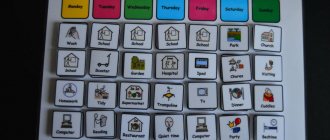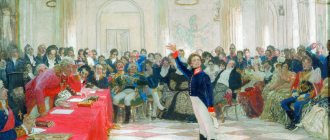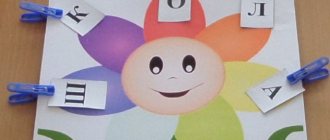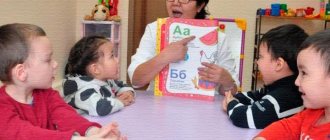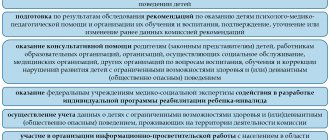The importance of speech development in preparing a child for school
Speech development plays a major role both in the immediate development of each child and in preparation for school. As soon as the baby reaches preschool age, speech becomes a universal means of cognition and communication for him and performs two main functions: intellectual and communicative.
In just a few years before starting school, children will have to make a truly marathon leap in mastering their native language.
It is necessary to accumulate vocabulary, learn the conceptual meaning of words, learn pronunciation, understand grammatical basics, and learn to express your thoughts coherently. All this is an important component of the intellectual potential of the future student.
In addition, speech is not only part of a child’s intellectual readiness for school. Speech helps a preschooler manage his activities and behavior.
This occurs due to the development of such self-regulation properties as planning. An action plan is built in the child’s mind as a speech model, which outlines the goal, sequence of actions, means and ways to achieve the goal. In the first years of life, a child masters such planning by listening to an adult, and by older preschool age he habitually uses inner speech to organize his activities.
Speech mediation is one of the most important links in the development of a child’s consciousness. By formulating goals and methods of action in words, children become aware of them. By the time the time comes to go to school and accept the new social role of a student with his responsibilities, the child must, to a certain extent, become a conscious and responsible person. Otherwise, he will not cope with educational tasks.
German psychologists have practically established that the academic failure of first-graders is very often due to their poor speech development.
Speech changes the relationship between thinking and action, and leads to the development of higher forms of intellectual activity. Speech development reflects the general development of the preschooler, the level of logical thinking, and the development of communication skills. Therefore, children’s speech readiness for school is a necessary condition for successful learning.
Characteristics of speech disorders in children
In speech activity, most children of senior preschool age are characterized by self-doubt; it is difficult for children to express their thoughts in the correct form. The hooting of parents causes children to begin to distort words, replacing some sounds with others that are more pleasing to the ear.
According to observations, 60% of older preschoolers have frequent violations of grammar and expressiveness of speech. This includes incorrect agreement of words when composing sentences. Even simple sentences can be very distorted. The vocabulary is poor or filled with vocabulary from popular television and computer programs and games.
Although children will master the basics of literacy only during school, nevertheless, in kindergarten it is already necessary to conduct special speech classes. Then at school it will be easier for children to learn the norms of the language. Important areas in speech activity are phonetics, vocabulary, grammar, and the ability to speak coherently when constructing small dialogues and short monologues.
Components of children's speech readiness for school
What components make up a child’s speech readiness for school? This is not only a certain amount of knowledge of the native language, but also mechanisms that ensure the development of speech. This is a complex development that ensures the child’s oral speech. It includes:
- Sensory speech - understanding what others are saying.
- Motor speech is the child’s own pronunciation of sounds and phrases.
- Lexicon.
- Awareness.
Sensory and motor functions are physiological parameters of speech readiness for school, and vocabulary and awareness indicate lexical preparation.
Sensory and motor speech components
At first glance, it may seem that talking about the sensory side of speech before entering school is no longer relevant. Understanding of the native language is formed from the first years of life, and the discrimination of words and phrases in an older preschooler is completely automatic. However, the Russian language is characterized by such subtleties that even a 6-year-old child has work to do in this direction.
There are many words where clear phonemic differentiation is necessary. For example, the word pairs pod-pot, meadow-onion, pharynx-sow, fruit-raft, rod-mouth and many others are close in sound, and for this reason it is difficult for many children to distinguish them. Errors indicate insufficient development of auditory perception and phonemic hearing - therefore, sensory function . It can and should be trained, since the understanding of the meaning of a word, and subsequently the student’s literacy, depends on the ability to accurately determine the sound.
Motor speech requires another differentiation - speech motor differentiation. This refers to clear articulation when a child pronounces sounds and words. It is normal if a child is 6 years old and already pronounces all sounds. But even if problems are still observed with particularly complex sounds (r, w), it is important to pay attention to the sound of the entire word.
If you do not pay attention to the correct pronunciation, then the child has an insufficiently formed sound culture of speech, which is why his statements become “sloppy.” In the statements of preschoolers (especially those who do not yet know how to read) there are “kicked”, “tilivisor”, “hare”, “posmoret”, “escavator” and other distorted words.
A particular difficulty lies in the fact that such errors are already fixed in the preschooler’s oral speech, and he will have to relearn. Where adults pay attention in time to how the child pronounces each word, the level of phonemic development corresponds to the age norm, and the preschooler correctly hears and pronounces all sounds and words.
Vocabulary and awareness
The vocabulary corresponding to the speech readiness of a preschooler for school should be about 4000 units. Speech messages in dialogues or monologues of children with such vocabulary include all parts of speech.
In addition to using the word, the child must understand its meaning. We can speak of high awareness only in cases where the preschooler has mastered the concept and applies it correctly.
An erroneous understanding can be formed completely by accident when a child hears words that are new to him in figurative statements and perceives them in his own way.
The examples are quite unexpected. One preschooler defined “sense” as some large lost thing (“the meaning was lost”), another learned the word “ridicule” as small light objects (“showered with ridicule”), the third was sure that “confetti” is candy. Such cases once again emphasize the responsibility of adults for the speech development of their children.
Characteristics of the speech features of older preschoolers
In the senior groups of kindergarten, in the process of speech development in children of senior preschool age, the main attention is paid to the development of monologue and dialogic speech, the formation of speech creativity in children. Classes are aimed at developing expressive speech in preschoolers.
In general, speech readiness for learning at school covers all types of speech activity of an older preschooler.
Now there are a lot of different manuals and other information base on speech development in older preschoolers.
Everywhere you can find various scenarios and lesson notes on this topic. It would seem, what else is there to talk about? But every year you become convinced that there are fewer and fewer speech-literate first-graders.
It's all because of the media, the computerization of children's minds. This not only does not enrich the speech of a preschool child, but on the contrary spoils the useful “speech norms of etiquette.”
MAGAZINE Preschooler.RF
Speech development and school readinessSpeech development of a preschooler
The development of speech is an urgent task of teaching in primary school, where the foundations of a person’s future personality are laid, because speech is the basis of all mental and practical activity, a means of human communication.
Preschool age is crucial for a child's learning: everything that a child learns or fails to learn in these early years will have a significant impact on his future intellectual development, and schooling will not be able to compensate for the gaps in children's development. Therefore, the main task of educators is to develop the cognitive abilities of preschoolers.
The formation of the basis of children’s intellectual abilities and the child’s cognitive development is carried out under the influence of the social environment. In the process of communicating with others, he learns the language, and with it the existing system of concepts. As a result, already at preschool age the child masters the language so much that he uses it freely as a means of communication.
Speech accompanies and improves the cognitive activity of children, makes work activity more focused and conscious, enriches games, promotes the manifestation of creativity and imagination in visual, musical, and literary activities.
To carry out work on the cognitive and speech development of children, the following means of speech development are used:
- Communication between adults and children
- Cultural language environment.
- Teaching native speech and language in the classroom.
- Fiction.
- Various types of art.
The teacher helps the child achieve communicative competence by the end of preschool age by solving problems for the development of different aspects of speech in all age groups:
- "Development of coherent speech"
- "Vocabulary Development"
- “Mastering grammatically correct speech”
- “Mastering the sound culture of speech”
- "Preparing for Literacy"
Readiness or unpreparedness of the child to start school
It is determined by the level of his speech development: it is with the help of speech that he will have to assimilate (and assimilate) the entire system of knowledge. If a six- to seven-year-old child mastered spoken language before school, he has yet to master written language.
A simple rule: the better a child’s oral speech is developed by the time he enters school, the easier it is for him to master reading and writing.
Unfortunately, for various reasons, every year more and more children come to the first grade with defects in the pronunciation of sounds, a poor vocabulary, and children who cannot construct a simple narrative sentence.
Testing speech readiness for school.
Correct pronunciation.
Before learning to read and write, the child must learn to pronounce all sounds correctly and clearly. It is unacceptable to have complete sound substitutions in his speech (SOLNYSKO instead of SOLNYSHKO, PALTA instead of PART). Such defects in the pronunciation of sounds are usually reflected in writing.
Presence of phonemic hearing.
To evaluate it, ask your child to write down a few words - not in letters, but in circles. There are as many circles as there are sounds in a word. For example, the word “house” should be depicted with three circles, the word “mother” with four.
Check whether the child understands the task correctly, and then dictate the words to the child so that he writes them in the form of circles.
Show him pictures on which animals are drawn (for example, a lion, a wolf, a cow) and the diagrams of their names are written in the form of circles (according to the number of sounds in a word). The child's task is to determine which circles go with which word.
Ability to distinguish sounds.
A clear distinction by ear of all speech sounds is one of the necessary prerequisites for mastering literacy. Writing any word requires the ability to identify each sound included in its composition and designate it with the corresponding letter. If some sounds seem the same to a child, when writing, he will inevitably have difficulty choosing the letters that correspond to these sounds (and make mistakes).
For example, if a baby does not distinguish between the sounds B and P by ear, he will not know which first letter (B or P) should be written in the word BALKA or in the word PALKA.
The study of auditory differentiation of sounds is carried out using specially selected pictures (the names of the objects depicted on them differ only in one sound being tested).
State of vocabulary.
A child of senior preschool age must have a vocabulary of at least 2,000 words (for some children it exceeds 5,000 words).
It should present the main parts of speech: nouns, verbs, adjectives, numerals, pronouns, adverbs, prepositions, coordinating and subordinating conjunctions.
To study it, a number of special techniques are used to determine the presence or absence of certain words in the child’s “dictionary” (see below).
Formation of grammatical systems.
This is, in essence, clarifying the question of whether the child has mastered the existing patterns of inflection and word formation in the language. A child with normally developing speech usually masters the grammatical system of inflection by the age of four, and the system of word formation by the age of seven.
These terms are quite arbitrary. Sometimes even a seven-year-old child says: “I got there by subway,” “there’s a sweater under my coat,” “hot coffee,” “put down my pencil,” “run faster,” “blizzard day,” “cyclist is a person who rides a bicycle,” etc. etc. (If the parents themselves say it correctly, this practically never happens).
Checking the child’s development of grammatical systems is important because even a very large vocabulary does not solve the problem of the usefulness of oral speech.
It is also important to be able to actively use existing words, to construct sentences and coherent statements from them, since only under this condition can one express one’s thoughts clearly enough. And for the correct construction of sentences, you need the ability to grammatically correctly coordinate words with each other.
Possession of coherent speech.
Coherent speech is usually understood as such extended (consisting of several sentences) statements that allow you to clearly and consistently express your thoughts.
Without fluency in coherent speech, the process of schooling is unthinkable (just think about the usual answers in class), so you need to worry about its development in a child already in preschool age.
Stories are usually divided into factual and creative.
The first, as the name shows, convey real events (facts) - based on their direct perception, or from memory.
The latter are built with the active participation of the creative imagination, thanks to which they can be supplemented with some details that did not exist in the real situation.
In form, stories can be descriptive or plot.
A descriptive story is a description of real or pictured things, plants, animals. There are no characters, there are no events, but the characteristics characteristic of a given subject are simply described. For example: “The puppy is black, shaggy; he has small ears and a short tail..."
In a plot story there is a beginning of action, its development, reaching some high point (culmination), and the completion of the “incident”, or denouement; events here must be transmitted in time sequence, taking into account cause-and-effect relationships.
Periodically offer your child tasks that test fluency in coherent speech:
- let him listen and retell a previously unknown story close to the text
- tell you how today went
- write a short story or story
- describe a picture of nature
- describe drawings in which, for example, children play, help adults, relax by the sea
- describe your family, friend or pet
- He will tell you how, for example, the preparation for the holiday and the holiday itself went, and he will try to express and describe his impressions.
Tasks for checking the state of the “dictionary”
- Naming objects belonging to various logical groups.
For example, the child must name all the types of trees, flowers, and animals known to him.
- Finding generalizing words for a group of homogeneous objects.
Squirrel, hare, wolf - who is it?
Cup, pan, frying pan, glass - what is it?
Blouse, trousers, T-shirt - what is this?
- Selection of attributes for a specific subject.
The jacket is new, red, warm;
the snow is white, loose, sparkling.
- Selection of possible actions to the subject.
The book is bought, read, considered;
the tree is planted, fertilized, etc.
- Selection of objects for a given action.
Prepare lunch, soup; draw a picture, a house; petting a child's head or a kitten.
- Selection of synonyms –
words with similar meaning
(kind, affectionate, gentle; huge, huge, large, tall).
- Selection of antonyms –
words with opposite meanings
(hot - cold, fast - slow, high - low).
Game "A Secret Around the World"
The children stand in a chain and whisper the phrase to each other. The last student in the group says it out loud.
Teacher's comment: Children try to pronounce the phrase correctly, because it depends on each of them in what form it will reach the last student.
Game "Understand Me"
One child stands facing the class. A word appears on the board (this could be a word from the dictionary, a phraseological phrase, etc.) Children explain its meaning, the child must pronounce this word.
At the same time, work is underway with an explanatory dictionary (book or on the computer). One student identifies lexical meaning in context.
(Suggestion card)
Teacher's comment: Enrichment of vocabulary is carried out in two ways: mastering the meaning of new words and revealing the wealth of lexical meanings of a word. An effective technique for revealing the meaning of a word is to use an explanatory dictionary.
This technique in the form of a game allows children to use their existing vocabulary, activates attention and mental activity, and develops communication skills.
Association game “Word chain”
Children in groups are given the floor and they must continue the verbal series, using words by association. The teacher asks: “What do you imagine when you hear this word?” For example, “fairy tale” , the next child calls “heroes” , “magic” ...
You can narrow the topic: winged animate words, round inanimate words, proverbs and sayings about work, etc.
Teacher's comment:
Such a simulator develops the mental activity of children, develops such an important skill as the ability to listen to each other, learn from each other, thereby replenishing their vocabulary.
"Synonyms"
Work with synonyms is aimed at expanding children's passive vocabulary through new words previously unknown to students and transferring them from passive to active vocabulary.
One speech simulator helps children learn the following feature of synonyms: synonyms denote the same concept, differ in shades of meaning or use in speech; second - synonyms are words that sound different; third - only words belonging to one part of speech can be synonyms.
Teacher's comment: such tasks help to enrich vocabulary by selecting words that are close in meaning and to learn the main features of synonyms.
Working on phrases and sentences
"Verbal Stream"
Children spread the proposal using the snowball . You can offer children a word or phrase, or a simple uncommon sentence.
Teacher's comment: This technique encourages children to choose the optimal solution to the task assigned to them and helps prevent errors such as poverty and monotony of syntactic structures.
“Help Alyonka collect apples”
This game helps children distinguish a phrase from a sentence, learn to find phrases, and help children understand internal connections in a sentence. This will help them in the future to navigate the structure of the sentence and, therefore, correctly place punctuation marks.
(Clicking the mouse on the apple will help determine whether the task was completed correctly. If the answer is incorrect, the apple falls down; if the answer is correct, the apple can be put in the basket).
"Help the mouse escape from the cat"
This type of work helps to work on word combinations in which children make speech errors (in control).
(Click on the mouse if the answer is correct - the mouse runs away).
“Guess” , “Bulletin Board”
Children receive a card with a picture of an animal or simply the name of any object, and describe this object in words. The rest of the guys name the object. The faster the listeners guess, the better those who guessed did the job.
Teacher's comment: Reception of verbal description activates vocabulary, preventing errors associated with violation of lexical compatibility.
"Rhymer"
Based on the beginning of the poem, compose your own continuation.
Teacher's comment: Children really like this type of work.
Creative work does not require a model.
The ability to construct sentences in free conditions indicates the development of speech. Such exercises are very valuable for the development of speech of a primary school student.
Demonstration of techniques that contribute to the formation of speech creativity of a primary school student.
Children are offered the following tasks: write a short essay “What did you think about the grade 2 given in the student’s diary? ”
| Next > |
Lexicon
The child must have a fairly well developed vocabulary, he must be oriented in the generic and specific relationships of objects:
— it is correct to classify individual objects into one or another group of objects (sofa-furniture, boletus-mushroom, violet-houseplant, mechanic-profession...)
- be able to define an object through a generic name and a specific concept: a sugar bowl is a container in which sugar is located... Cuts vegetables - a vegetable cutter...
The game “Word Auction” will help expand and enrich children’s vocabulary with adjectives. Any item will do for the game.
Invite your child to name the following words:
- What saucepan? The child says: pure, then your word is “deep”... etc. Whoever ends up with the words wins...
Select the fourth extra item:
- airplane, helicopter, bicycle, hot air balloon.
- tit, sparrow, rook, bullfinch.
The child must know a few “stubborn” words: those that never change: “coat”, “cocoa”...
By the end of the 6th year, a preschooler must understand and use antonyms in speech - select pairs of words with opposite meanings, denoting spatial concepts (high - low...), states of objects (hot - cold), human feelings (cheerful - sad), spatial and temporal concepts (early - late, here - there, earlier later, left - right) and others.
6-year-old children begin to comprehend and understand words with a figurative meaning (golden hands, time creeps, short memory).
It is important to work on synonyms - words that are similar in meaning and that express different shades of semantic meaning (cheerful - joyful - funny).
Also, by the end of the year, the child can understand and name related, similar words with the help of adults:
Snow - snowfall, snowman, Snow Maiden, bullfinch.
How to develop expressive speech in an older preschooler
Expressive children's speech is a very rare phenomenon. But such speech is a sign of an intellectually developed child. Children with expressive speech later study well and have good relationships with teachers. To form such speech, it is again important to interest the child. And what, no matter how the game, will help in this process. Theatrical games or dramatization will help develop expressiveness. Children take on different roles. At the same time, they do not speak in their own voice, but try to imitate the heroes of history. Here both intonation and timbre of speech change for the better. Preschoolers, in the role of a theatrical performance, try to pronounce words and sentences as clearly and expressively as possible. They feel like real artists, and artists must speak beautifully.
What means to use in the process of speech correction?
Children's speech readiness is often achieved through games. Including correction through didactic games and exercises.
Conversations should also be given great attention. During a conversation with an adult, a child of the age we are considering will try to speak more expressively. In such conversations, you can use different training phrases. For example, start with one word, then ask the child to repeat a phrase of two words, then of three. Gradually reach a sentence, from simple to complex.
In classes on speech development, it is very important to take an individual approach to each child, because speech disorders are different for each preschooler. The quality of speech correction in children of senior preschool age depends on how interested the children are in the development of correct and expressive speech. Are children of this age sincerely interested in learning to speak beautifully and expressively?
The effectiveness of correcting children's speech is facilitated by independent children's games, during which children look at pictures and books. After this, you can ask preschoolers what they did, what they looked at, what is depicted in the books.
This approach will help teach children to discuss with the teacher and other children what they saw and what they did.
When the violations are too serious, for example, problems with the child’s articulation apparatus, it will be useful to work with the child in front of a mirror, teach him to use articulation correctly. Explain how the tongue works, how it should be positioned when pronouncing a particular sound.
